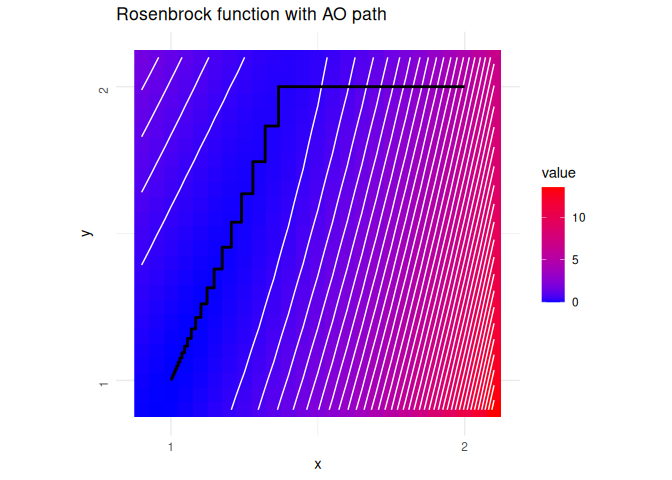The ao package implements alternating optimization (AO) in R.
Why?
AO is an iterative process that optimizes a function by alternately performing restricted optimization over parameter subsets. Instead of joint optimization, it breaks the optimization problem down into simpler sub-problems. This approach can make optimization feasible when joint optimization is too difficult.
The AO process implemented in ao can be
viewed as a generalization of joint optimization,
used for minimization and maximization problems and with custom partitions of the parameters,
randomized by changing the parameter partition randomly after each iteration,
run in multiple parallel processes for different initial values, parameter partitions, and/or base optimizers.
See the package vignette for more details.
How?
You can install the released package version from CRAN with:
install.packages("ao")Then load the package via library("ao") and you should be ready to go. Here is a simple example of alternating minimization of the Rosenbrock function:
rosenbrock <- function(x) (1 - x[1])^2 + (x[2] - x[1]^2)^2The resulting optimization path …

… is obtained as follows:
ao(f = rosenbrock, initial = c(2, 2))
#> $estimate
#> [1] 1.000895 1.001791
#>
#> $value
#> [1] 8.016137e-07
#>
#> $details
#> iteration value p1 p2 b1 b2 seconds
#> 1 0 5.000000e+00 2.000000 2.000000 0 0 0.000000000
#> 2 1 1.519238e-01 1.366025 2.000000 1 0 0.004212141
#> 3 1 1.339744e-01 1.366025 1.866024 0 1 0.002035141
#> 4 2 1.176778e-01 1.320824 1.866024 1 0 0.002771139
#> 5 2 1.029278e-01 1.320824 1.744575 0 1 0.001895189
#> 6 3 8.966402e-02 1.278883 1.744575 1 0 0.004005909
#> 7 3 7.777546e-02 1.278883 1.635540 0 1 0.002469063
#> 8 4 6.719114e-02 1.240415 1.635540 1 0 0.002768040
#> 9 4 5.779955e-02 1.240415 1.538630 0 1 0.003015041
#> 10 5 4.952339e-02 1.205560 1.538630 1 0 0.002884865
#> 11 5 4.225482e-02 1.205560 1.453374 0 1 0.001970053
#> 12 6 3.591491e-02 1.174366 1.453374 1 0 0.002742052
#> 13 6 3.040344e-02 1.174366 1.379135 0 1 0.001869917
#> 14 7 2.564430e-02 1.146792 1.379135 1 0 0.002977848
#> 15 7 2.154801e-02 1.146792 1.315133 0 1 0.002017021
#> 16 8 1.804492e-02 1.122712 1.315133 1 0 0.003154993
#> 17 8 1.505832e-02 1.122712 1.260483 0 1 0.001919985
#> 18 9 1.252724e-02 1.101923 1.260483 1 0 0.003431082
#> 19 9 1.038836e-02 1.101923 1.214235 0 1 0.001927137
#> 20 10 8.590837e-03 1.084167 1.214235 1 0 0.008159876
#> 21 10 7.084101e-03 1.084167 1.175418 0 1 0.001954079
#> 22 11 5.827377e-03 1.069149 1.175418 1 0 0.007063150
#> 23 11 4.781578e-03 1.069149 1.143079 0 1 0.001844168
#> 24 12 3.915156e-03 1.056558 1.143079 1 0 0.006755829
#> 25 12 3.198754e-03 1.056558 1.116314 0 1 0.002441883
#> 26 13 2.608707e-03 1.046082 1.116314 1 0 0.018714190
#> 27 13 2.123531e-03 1.046082 1.094287 0 1 0.001847982
#> 28 14 1.725945e-03 1.037424 1.094287 1 0 0.002268076
#> 29 14 1.400576e-03 1.037424 1.076249 0 1 0.002501965
#> 30 15 1.135093e-03 1.030310 1.076249 1 0 0.002749205
#> 31 15 9.187038e-04 1.030310 1.061539 0 1 0.001985073
#> 32 16 7.427825e-04 1.024492 1.061539 1 0 0.003801823
#> 33 16 5.998755e-04 1.024492 1.049585 0 1 0.003378153
#> 34 17 4.840462e-04 1.019754 1.049585 1 0 0.005733967
#> 35 17 3.902161e-04 1.019754 1.039898 0 1 0.001929998
#> 36 18 3.143566e-04 1.015907 1.039898 1 0 0.002388000
#> 37 18 2.530454e-04 1.015907 1.032068 0 1 0.001893997
#> 38 19 2.035803e-04 1.012794 1.032068 1 0 0.002493143
#> 39 19 1.636760e-04 1.012794 1.025751 0 1 0.002291918
#> 40 20 1.315375e-04 1.010279 1.025751 1 0 0.002350807
#> 41 20 1.056496e-04 1.010279 1.020663 0 1 0.001892805
#> 42 21 8.482978e-05 1.008251 1.020663 1 0 0.002317905
#> 43 21 6.807922e-05 1.008251 1.016570 0 1 0.001904011
#> 44 22 5.462405e-05 1.006619 1.016570 1 0 0.002228022
#> 45 22 4.380882e-05 1.006619 1.013281 0 1 0.001803875
#> 46 23 3.513011e-05 1.005307 1.013281 1 0 0.003870964
#> 47 23 2.815916e-05 1.005307 1.010641 0 1 0.002097845
#> 48 24 2.257018e-05 1.004252 1.010641 1 0 0.002288103
#> 49 24 1.808332e-05 1.004252 1.008523 0 1 0.001908779
#> 50 25 1.448872e-05 1.003406 1.008523 1 0 0.002306938
#> 51 25 1.160399e-05 1.003406 1.006825 0 1 0.001830101
#> 52 26 9.294548e-06 1.002728 1.006825 1 0 0.002260208
#> 53 26 7.441548e-06 1.002728 1.005463 0 1 0.002681017
#> 54 27 5.959072e-06 1.002184 1.005463 1 0 0.002296925
#> 55 27 4.769667e-06 1.002184 1.004373 0 1 0.001475811
#> 56 28 3.818729e-06 1.001748 1.004373 1 0 0.002235174
#> 57 28 3.055717e-06 1.001748 1.003499 0 1 0.001893997
#> 58 29 2.446111e-06 1.001399 1.003499 1 0 0.002182007
#> 59 29 1.956863e-06 1.001399 1.002800 0 1 0.001785994
#> 60 30 1.566279e-06 1.001119 1.002800 1 0 0.002191067
#> 61 30 1.252688e-06 1.001119 1.002240 0 1 0.001884937
#> 62 31 1.002554e-06 1.000895 1.002240 1 0 0.002276897
#> 63 31 8.016137e-07 1.000895 1.001791 0 1 0.001425982
#>
#> $seconds
#> [1] 0.1816533
#>
#> $stopping_reason
#> [1] "change in function value between 1 iteration is < 1e-06"Contact?
If you have any questions, found a bug, need a feature, just file an issue on GitHub.
